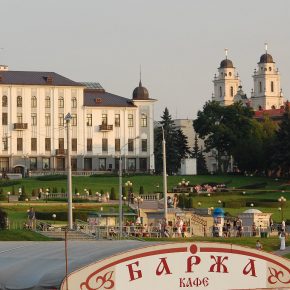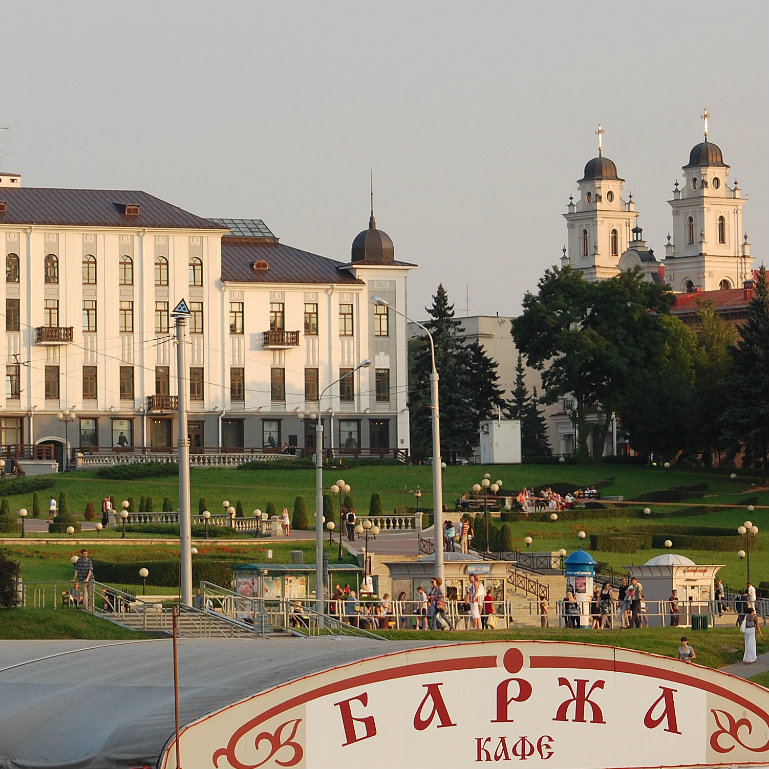Tydzień w gospodarce
Category: Trendy gospodarcze

Minsk, Belarus (Andrea, CC BY-SA)
However, for now it appears that only Russian financial assistance can rescue cash-strapped Belarus from a new financial crisis.
On February 29th, Belarusian finance minister Vladimir Amarin told journalists that the government needs up to two weeks to secure a new USD2bn loan from the Russia-led Eurasian Fund for Stabilisation and Development (EFSD), which previously rescued Minsk from a severe balance-of-payment crisis five years ago.
This statement appeared four days after the Russian President Vladimir Putin and the Prime Minister Dmitry Medvedev met in Minsk with Alexander Lukashenko and the Belarusian government. However, despite high expectations that the Russian leadership would announce the allocation of badly-needed funding for Minsk, it preferred to keep silent.
„The discussion on this issue is due to be continued,” Sergei Storchak, Russia’s deputy Finance Minister, explained to journalists the day after the meeting in Minsk.
Meanwhile, the Belarusian government cannot afford the luxury of waiting extremely long. In 2016, the country’s finance ministry must repay USD1bn in external liabilities, USD1.2bn in interest payments on FX debt, and USD1bn in local FX-denominated bonds. The country’s central bank is due to repay up to USD2.5bn of FX-denominated local bonds within the next 12 months, which were obtained mainly by local commercial banks, according to a report by the VTB Capital consultancy that was published in mid-February.
This situation looks very worrying, given that the country’s foreign reserves had fallen to USD4.03bn as of the beginning of February.
Mark McNamee, a London-based analyst at Frontier Strategy Group, believes that Moscow has a far stronger interest in Belarus staying in Russia’s orbit, and will be able to provide funding to the country despite the fact that Russia itself is „broke”, due to low oil prices and a continuing trade war with the West.
„Russia has reduced or cut various economic and military plans with Kyrgyzstan, Tajikistan, and Armenia in recent months. So it is hard to see how they plan to assist anyone else in their periphery, particularly as oil prices have dipped further and they are already funding their Syrian venture, Crimea, and the Donbas,” McNamee tells the Central European Financial Observer, adding that Moscow has a far stronger interest in Belarus’s stability and future than in the countries of Central Asia or the Caucasus.
The expert adds that Moscow’s support could not only take the form of a new loan, but also „some combination of funding and alterations to the energy subsidy”.
Belarus is heavily dependent on Russian energy subsidies in the form of discounted natural gas prices and cheap oil, which is refined in Belarus. According to the International Monetary Fund (IMF), energy support from Russia stood at 12.7 per cent of Belarus’s GDP in 2013, and up to 14.9 per cent of the country’s GDP in 2012.
„However, all that of course would be considered in light of what the West would be willing to deliver,” McNamee adds, pointing to a recent thaw between Belarus and the Western nations.
On February 25th, the Council of the EU announced its official decision to lift the main part of its sanctions against Belarusian officials and companies. Experts believe that the move could help Minsk to borrow on more favourable terms through a new placement of Eurobonds. The government in Minsk is considering to raise up to USD1.5bn on the international market in 2016.
Meanwhile, the Belarusian economy is badly hit by the economic crisis in Russia, Minsk’s traditional trade market. Due to weakening demand in Russia, Belarusian exports of merchandise to Russia dropped from USD15.181bn in 2014 to USD10.389bn in 2015.
What is even more important, Russia’s share of Belarusian exports of merchandise fell to 38.9 per cent in 2015, compared with 42.1 per cent the previous year. The share of Belarusian exports to the EU, in turn, has increased: up to 32.2 per cent in 2015 from 29.5 per cent in 2014.
(infographics Zbigniew Makowski)
„Probably, the share of the Russian market will continue to decrease as Russia experiences economic decline, triggering weakening demand for Belarusian products,” Alexander Mukha, a Minsk-based financial expert, tells the Central European Financial Observer. „Trade protectionism is also getting heavier in Russia.”
The current improvement in relations with the West could potentially facilitate an agreement with the IMF over a new USD3bn loan, which Belarus has actively discussed with the lender in recent months. However, on February 29th, Amarin unexpectedly announced that the negotiations with the multinational lender had been suspended, without providing any details.
There can be little doubt that the talks have been halted due to Lukashenko’s strong opposition to initiating structural reforms in the country. According to the presidential media office, a week before Amarin’s statement Lukashenko urged the government that there will not be „any endorsement of so-called unpopular measures that will hit the population”. „Belarus does not need reforms similar to those carried out in Russia [in the 1990s] by [the economist and politician] Yegor Gaidar,” Lukashenko added.
Previously, the IMF repeatedly called for the Belarusian authorities to demonstrate „strong commitment at the highest level” to a comprehensive package of deep structural reforms and consistent macroeconomic policies.
Meanwhile, McNamee believes that Russia could also have stipulated structural reforms among the conditions for the allocation of the USD2bn funding. „But primarily any funding would likely come with terms attached related to the energy subsidy schemes, the earlier-proposed [Russian] military base [in Belarus], or other political assurances of Belarus’s loyalty to Moscow,” the expert adds.
Indeed, many experts believe that one of the conditions for the allocation of the USD2bn loan would be an agreement to establish a Russian air base in the Belarusian city of Baranovichi, 145 km from Minsk, which the Moscow leadership has already discussed with Lukashenko. The establishment of this base would be a demonstration by the Kremlin of its readiness to protect its geopolitical interests in the region.
Despite the diminishing chances of a new IMF support programme being agreed, the lifting of the EU sanctions provides an opportunity for Belarus to secure more financial support from the European Bank for Reconstruction and Development (EBRD), which had limited its cooperation – financial and technical – with the Minsk authorities after the disputed December 2010 presidential election.
Belarus has also started talks over possible cooperation with the European Investment Bank (EIB), which was previously unable to operate in the country due to strained Belarus-EU relations.
„The EIB could only act in Belarus based on a decision by the relevant EU institutions. As of now, no decision has been taken by those institutions that would allow the EIB to start operations in Belarus. In addition, to start operations, the bank would need to sign a framework agreement with the Belarusian authorities regulating the bank’s activities in the country,” Matteo Maggiore, the lender’s spokesman, tells the Central European Financial Observer.
„Further cooperation with the EIB and EBRD should be expected. Belarus is in dire need of funds, of course, and this is an effective way of attracting money without the stricter austerity of the IMF,” McNamee says. „These groups can now work to help finance the vast array of state-owned firms, of course with conditions, helping to ease the state’s burden of managing these corporations with its further dwindled government resources.”
According to the expert, assistance from the EIB and the EBRD could help to free up critical resources, which, potentially combined with Russian financial assistance, would help Belarus to pay off its debts this year.


